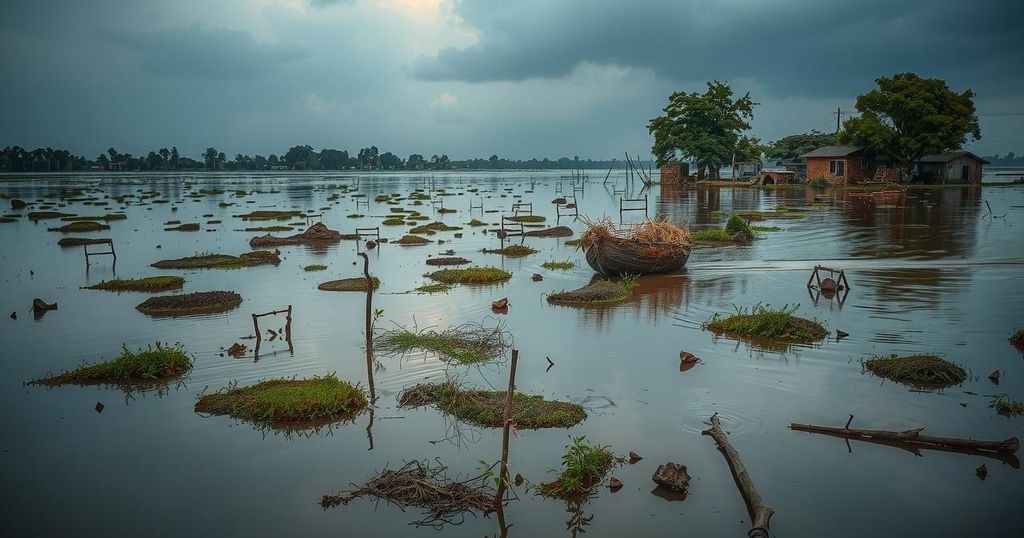Severe flooding in South Sudan has displaced over 226,000 people and submerged health facilities, exacerbating an already critical health crisis. The WHO is mobilizing emergency responses by distributing health kits and focusing on disease management, particularly for cholera and malaria. Moreover, the flooding has raised concerns regarding the cumulative impacts of climate change on public health in the region.
South Sudan is currently experiencing some of the most severe flooding in decades, resulting in significant destruction across multiple regions. More than 226,000 individuals have been displaced as a consequence of the flooding, which has adversely affected homes, livelihoods, infrastructure, and access to essential services. In total, 42 out of the country’s 78 counties have been impacted by the floods, leading to the submersion of 58 health facilities across five counties and rendering nearly 90 additional facilities inaccessible due to the inundation of 15 principal roads. Critical access routes to the capital, Juba, have also been affected, compromising the availability of tertiary health services. As of October 4, 2024, it is reported that approximately 890,000 individuals in flood-impacted areas have been affected by this crisis. Although South Sudan frequently experiences heavy rainfall during its rainy season from April to November, the intensity of these floods has amplified due to climate change. This exacerbation has overwhelmed local communities, leading to permanent displacements in certain areas. Currently, South Sudan is also hosting nearly 800,000 refugees and returnees fleeing armed conflicts in neighboring Sudan. In Renk County, which serves as a primary entry point for many refugees, two suspected cases of cholera have emerged, and there has been a notable rise in malaria cases, with over 120,000 reported along with 31 suspected fatalities as of September 29, 2024. Additionally, there have been 55 reported incidents of snakebites in just five weeks. “People are in a heightened state of vulnerability due to multiple shocks. WHO is committed to work with the Ministry of Health and our partners to ensure that they have access to essential health services continue while also prioritizing the response to growing humanitarian and health needs,” stated Dr. Humphrey Karamagi, the World Health Organization (WHO) Representative in South Sudan. In response to this complex health emergency, the WHO has distributed approximately 88 metric tonnes of emergency health kits to vital locations such as Renk, Bentiu, Malakal, and Bor. These kits are capable of treating over 870,000 individuals and include essential medical supplies comprising interagency emergency health kits, cholera kits, antimalarial medication, and snakebite antivenoms. Since January 2024, WHO has also distributed nearly 1,300 malaria kits across the nation and has positioned 20 cholera investigation kits along with 9,200 rapid diagnostic tests for cholera, which can process 9,400 samples. To further enhance the response, WHO collaborates with the Ministry of Health in South Sudan to intensify their response to the ongoing health crisis. This includes coordinating the emergency health response and conducting a rapid needs assessment in Cueibet County to gather critical data and provide training for health workers, thus fortifying the emergency response framework. WHO is actively engaging with local authorities and community leaders to safeguard medical facilities against damage and relocate essential medical supplies to safer areas. Furthermore, WHO continues to monitor the health repercussions of the flooding, focusing particularly on vector-borne and water-borne diseases. This on-the-ground collaboration aims to ensure that emergency health support reaches those most in need. Across the African region, WHO remains dedicated to assisting governments in building climate-resilient health systems that can effectively adapt to both existing health needs and emerging threats posed by climate change. The challenge of climate change poses a significant risk to public health, necessitating robust legal, institutional, and operational frameworks for effective mitigation and adaptation efforts. WHO supports countries in developing measures to cope with environmental changes affecting health systems and in tracking national advancements in safeguarding health against climate impacts while reducing carbon emissions within health systems.
The context surrounding this article involves a humanitarian crisis in South Sudan that is being exacerbated by severe flooding, which has intensified due to climate change. The flooding has a profound impact, displacing thousands of people and critically affecting health services and infrastructure. The WHO’s response involves providing emergency health kits and addressing the rising incidents of diseases such as cholera and malaria, demonstrating the pressing need for coordinated health interventions in the face of natural disasters and ongoing humanitarian challenges.
In conclusion, the severe flooding in South Sudan has led to a catastrophic humanitarian situation which has severely disrupted public health services and increased the need for essential health interventions. The WHO is actively mobilizing efforts to provide medical support and mitigate the health impacts on affected populations. This response highlights the urgent necessity for comprehensive strategies to address both the immediate health needs and the broader implications of climate change on health systems globally.
Original Source: www.afro.who.int






